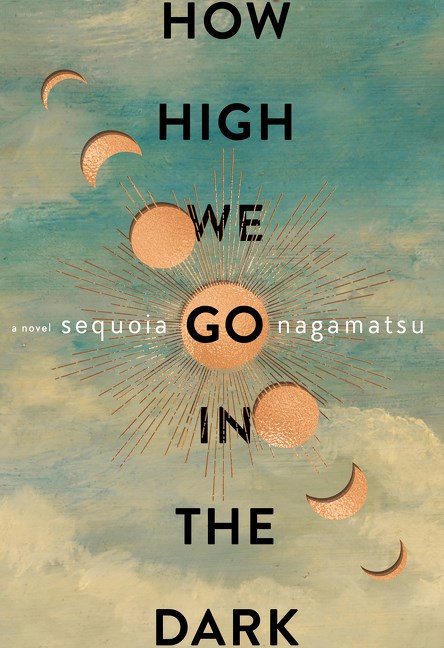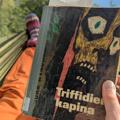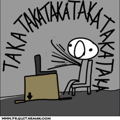(em português: sol2070.in/2025/04/livro-how-high-we-go-in-the-dark/ )
How High We Go in the Dark (2023, 320 pages) by Sequoia Nagamatsu. I stumbled upon this book randomly: I found the synopsis intriguing and was curious about this recent dystopian bestseller I had never heard of. What ultimately led me to read it was Alan Moore’s recommendation:
"Haunting and luminous . . . Beautiful and lucid science fiction. An astonishing debut."
The setting is a pandemic that wipes out most of humanity, caused by a virus released with the thawing of Arctic permafrost. In other words, it’s a climate fiction novel about an accelerated end-of-the-world scenario. We follow the stories of different characters over the following decades, presented like independent short stories, but all interconnected through the environmental context. There’s also a central plotline that gradually unfolds in the background. All stories focus on family or romantic relationships, most involving loss and grief.
This is the central theme of the novel — how people respond intimately and emotionally to the losses of an apocalypse — developed brilliantly, deeply, and movingly, full of pop and nerd culture, with a bit of rock ’n’ roll.
With billions dying from the pandemic, one sector comes to dominate the economy: the funeral, palliative, or hospicing services. Megacorporations form around death. Instead of Big Tech, what rules is a kind of “Big Death.”
One of the most devastating stories takes place in a kind of Disneyland for child euthanasia, where terminally ill children spend their last day in intense fun, dying on a roller coaster.
In another, the protagonist has a menial job in a
“eulogy hotel”, where those who can afford it house their dying loved ones to spend their last days in luxury.
The sci-fi setting serves as a stage for stories of lives marked by death. But that’s not all. There’s a mystery surrounding the virus’s origin that leads to cosmic revelations, including an intriguing otherworldly dimension and the challenge of regeneration (more on that in the “Spoiler” section).
This format of human stories connected within a larger sci-fi framework reminded me of the classic The Martian Chronicles (1950), where master Ray Bradbury imagines the very personal lives involved in the colonization of Mars.
Another distinctive element is that almost all the characters are of Japanese descent, although most stories take place in the U.S., with a few in Japan. The often uneasy intergenerational experience of families who migrated to the U.S. appears frequently. This isn’t just a reflection of the author’s Japanese-American identity — there’s a fantastical element that centrally connects the Asian archipelago to the plot.
These highly speculative elements, which break the predominant realism, might surprise or even shock readers fully immersed in the powerful human dimension of the stories. At times I thought, “Where did that come from?!” But upon closer reflection, these elements don’t come out of nowhere — they had been subtly foreshadowed throughout the stories.
The way the various characters are connected is intricate, and I got lost a few times. I’d have to reread it to fully grasp everything. Still, I didn’t find that crucial and enjoyed the book regardless.
Spoiler: Fantastic and Supernatural Elements
The title of the book refers to a scene in a post-death beyond, where a crowd of people who died in the pandemic, immersed in total darkness, build a human pyramid to see how high the darkness goes, or whether they could escape. What they manage is to lift a baby to the top — where gravity is almost absent — and the child ascends from there to be reborn.
It’s a fantastic and surreal chapter, so central that it gives the book its name: “How High We Go in the Dark.” But I didn’t quite understand how it connects to the other stories, except that some of the lives portrayed there had already been told.
Midway through the book, an ark carrying 50 chosen people escapes a depopulated and virus-ravaged Earth in 2037, on a journey in search of a habitable planet. The ship is powered by artificial micro-black holes, following the discovery of this revolutionary technology, told in another chapter. They spend 6,000 years in cryogenic suspension, with key individuals waking periodically to assess potential planets along the way.
They pass a dead planet with ruins of an advanced civilization, while on Earth, centuries have gone by and humanity has already regenerated and flourished again.
In the end, an immortal alien species is revealed, responsible for creating and caring for worlds like Earth. The woman who designed life on Earth had been living on the planet since its beginning, and the body of the mixed-race Neanderthal — with a strange glow in her chest from where the virus escaped — was her daughter. The virus was the accidental result of something that shouldn’t have happened: interspecies crossbreeding.
These elements completely break the realism that dominates 90% of the book. Since they make up a much smaller portion of the story, even though they explain the rest, I felt they were a bit disconnected, despite their intriguing quality.
It doesn’t ruin the book, and I definitely recommend it.













